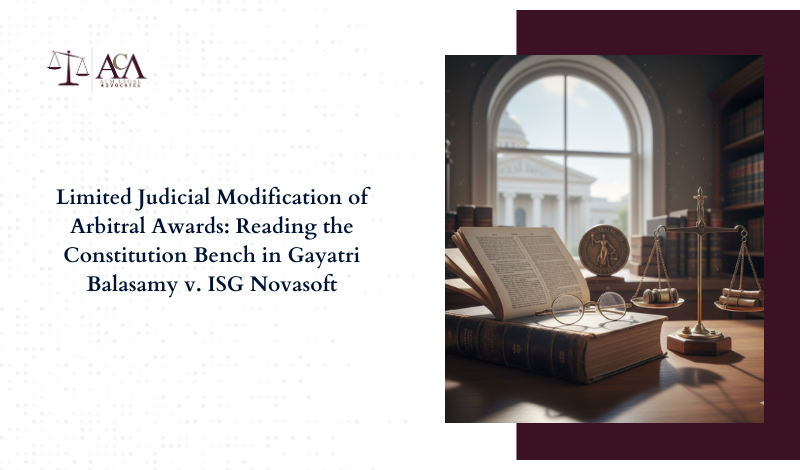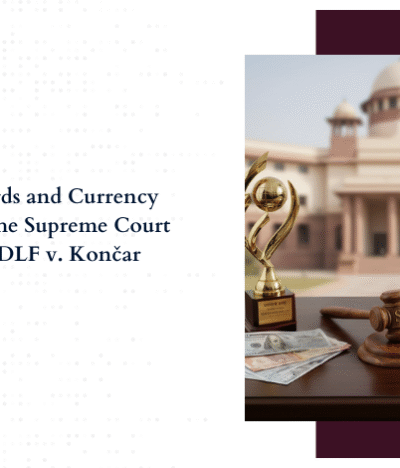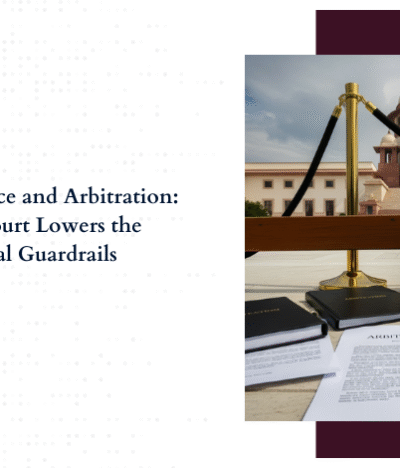For years, Indian arbitration law carried a sharp divide: courts could either set aside an arbitral award under Section 34 of the Arbitration and Conciliation Act, 1996, or they could let it stand. “Modification” of an award was taboo, seen as inconsistent with the limited judicial interference promised under the Act. That orthodoxy has now been shaken.
In Gayatri Balasamy v. ISG Novasoft Technologies Ltd. (2025) [1], a Constitution Bench of the Supreme Court clarified that Indian courts do possess a narrow power to sever or modify arbitral awards under Sections 34 and 37. But this is no blanket license—it is a carefully fenced-in exception, meant to prevent injustice without converting the court into a second arbitral tribunal.
This ruling is not just a technical tweak. It reshapes how lawyers will draft challenges, how judges will balance finality with fairness, and how parties will assess risk when entering arbitration. Understanding what the Court has opened the door to—and what remains firmly shut—is essential for anyone working with arbitral disputes in India.
Background of the Dispute
The case arose from a share purchase agreement between Gayatri Balasamy, an individual investor, and ISG Novasoft Technologies Ltd., a software company. Disagreements on the performance of contractual obligations escalated into arbitration, resulting in an award that partly favored ISG Novasoft.
The arbitral tribunal had directed specific monetary payments and contractual enforcement, but the manner in which it apportioned relief created problems. Some parts of the award were legally sustainable, while others were clearly unsupportable. The aggrieved party challenged the award under Section 34 of the Arbitration and Conciliation Act, 1996, arguing not for a wholesale setting aside, but for correction of the tainted portions.
The central legal issue was stark:
- Can Indian courts modify or sever an arbitral award when only a portion of it suffers from legal infirmity?
- Or must courts take an “all-or-nothing” approach—either uphold the award in full or set it aside entirely?
Historically, precedent leaned towards the latter. Cases like McDermott International v. Burn Standard Co. had emphasized that courts cannot correct errors within the award; their powers were limited to setting it aside. Yet, in practice, this rigid stance often led to wasteful relitigation—forcing parties back to square one even when most of the award was unimpeachable.
The Constitution Bench was thus tasked with resolving this tension between finality of arbitral awards and pragmatic justice in partial invalidation.
Constitution Bench Ruling: What the Court Held
In a landmark judgment delivered on 30 April 2025, the five-judge Constitution Bench departed from the rigid “all-or-nothing” model and held that limited modification of arbitral awards is legally permissible under Sections 34 and 37.
Key Holdings
- Severability of Awards
- If an award contains distinct and separable parts, courts may set aside only the offending portion while letting the rest survive.
- This avoids striking down an entire award when only a part is legally flawed.
- If an award contains distinct and separable parts, courts may set aside only the offending portion while letting the rest survive.
- Permissible Modification
- Courts may modify the relief granted, provided such modification does not involve rewriting the contract or stepping into the tribunal’s shoes.
- Example: If an award grants damages beyond the contractual cap, a court can reduce the amount to within the cap instead of voiding the whole award.
- Courts may modify the relief granted, provided such modification does not involve rewriting the contract or stepping into the tribunal’s shoes.
- Boundary of Intervention
- Courts cannot reassess evidence, recalculate damages afresh, or reopen factual findings.
- Intervention is limited to removing or correcting the illegality that strikes at the enforceability of the award.
- Courts cannot reassess evidence, recalculate damages afresh, or reopen factual findings.
- Sections 34 and 37 in Harmony
- Section 34 (set-aside proceedings) and Section 37 (appeals) must be read as empowering courts not only to annul but also to mould relief appropriately, provided the modification flows logically from the statutory grounds of challenge.
- Policy Rationale
- The Court emphasized that arbitration is meant to provide finality and efficiency.
- Allowing limited modification prevents injustice and avoids forcing parties into fresh rounds of arbitration for issues already settled.
- The Court emphasized that arbitration is meant to provide finality and efficiency.
In essence, the Court has recalibrated judicial review in arbitration: no longer a blunt hammer, but a surgical scalpel.
Practical Implications: What Courts May Modify and What Remains Off-Limits
The Constitution Bench judgment draws a clear line: courts may trim an arbitral award, but they cannot rewrite it. This distinction will govern every Section 34 and 37 challenge going forward.
What Courts May Modify or Sever
- Excess Relief Beyond Contract Terms
- If a tribunal grants damages, interest, or specific relief beyond what the contract allows, courts can scale it back to match the legal limit.
- Illegally Granted Claims
- If part of the award rests on a claim that is patently barred by law, that portion may be struck out without disturbing valid claims.
- Mathematically or Arithmetically Incorrect Awards
- Courts can correct clear computational errors if they flow from an otherwise valid finding.
- Severable Clauses in Multi-Issue Awards
- Where an award deals with multiple independent disputes, only the unsustainable portion can be excised.
What Courts Cannot Do
- Reappraise Evidence
- Courts cannot weigh witness testimony or documents afresh. That is the tribunal’s exclusive domain.
- Substitute Judicial Discretion for Tribunal’s
- A judge cannot decide what damages “should have been awarded” on the merits; they can only pare down what is legally impermissible.
- Recalculate Damages
- If damages are excessive due to poor reasoning but not illegal per se, the award cannot be judicially reworked.
- Rewrite Commercial Bargains
- Courts remain barred from altering contractual terms or supplying relief the tribunal never contemplated.
- Courts remain barred from altering contractual terms or supplying relief the tribunal never contemplated.
The Balance Achieved
This framework attempts to balance finality of arbitral awards with minimal judicial correction. Courts now act as a safety valve—ensuring awards do not become unjust or unlawful—without converting themselves into secondary arbitral tribunals.
Conclusion
The Constitution Bench ruling in Gayatri Balasamy v. ISG Novasoft marks a turning point in Indian arbitration law. By recognising the power of courts to partially modify or sever arbitral awards under Sections 34 and 37, the Supreme Court has moved away from an impractical all-or-nothing approach.
For businesses, this means greater certainty—an award that is largely sound will not be sacrificed because of a single flawed component. For the judiciary, it imposes a responsibility to exercise this power sparingly, transparently, and within statutory limits.
In effect, the Court has chosen pragmatism over rigidity, striking a balance between finality and fairness. Arbitration in India now stands on a stronger, more credible footing, with the safety net of limited judicial modification ensuring that justice is not derailed by technical excesses.
[1] S.L.P.(C) Nos.15336-15337 of 2021






